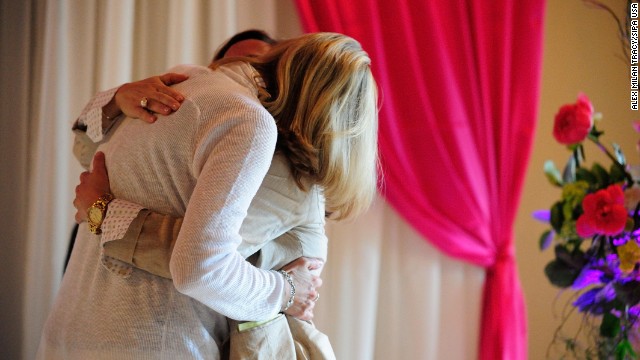 Julie Engbloom, left, and Laurie Brown embrace after being wed in Portland, Oregon, on Monday, May 19, after a federal judge struck down the state's voter-approved ban on same-sex marriage.
Julie Engbloom, left, and Laurie Brown embrace after being wed in Portland, Oregon, on Monday, May 19, after a federal judge struck down the state's voter-approved ban on same-sex marriage. 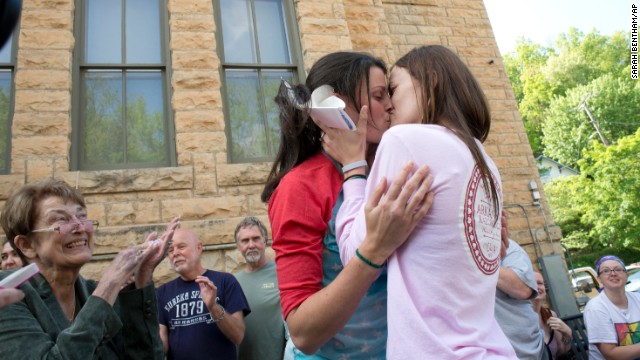 Jennifer Rambo, right, kisses her partner, Kristin Seaton, after their marriage ceremony in front of the Carroll County Courthouse in Eureka Springs, Arkansas, on Saturday, May 10. At left is Sheryl Maples, the lead attorney who filed the Wright v. State of Arkansas lawsuit. Rambo and Seaton were the first same-sex couple to be granted a marriage license in Eureka Springs after a judge overturned Amendment 83, which banned same-sex marriage in the state of Arkansas.
Jennifer Rambo, right, kisses her partner, Kristin Seaton, after their marriage ceremony in front of the Carroll County Courthouse in Eureka Springs, Arkansas, on Saturday, May 10. At left is Sheryl Maples, the lead attorney who filed the Wright v. State of Arkansas lawsuit. Rambo and Seaton were the first same-sex couple to be granted a marriage license in Eureka Springs after a judge overturned Amendment 83, which banned same-sex marriage in the state of Arkansas. 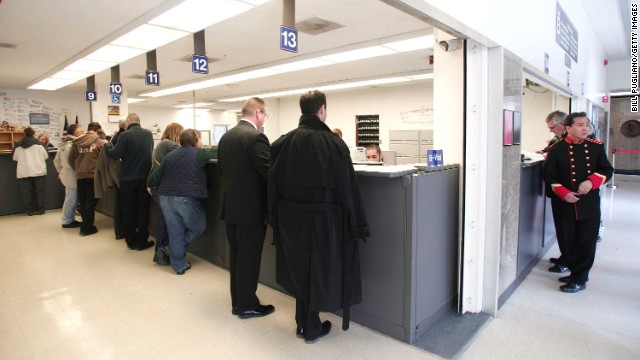 Same-sex couples get their marriage licenses at the Oakland County Courthouse in Pontiac, Michigan, on Saturday, March 22, a day after a federal judge overturned Michigan's ban on same-sex marriage.
Same-sex couples get their marriage licenses at the Oakland County Courthouse in Pontiac, Michigan, on Saturday, March 22, a day after a federal judge overturned Michigan's ban on same-sex marriage. 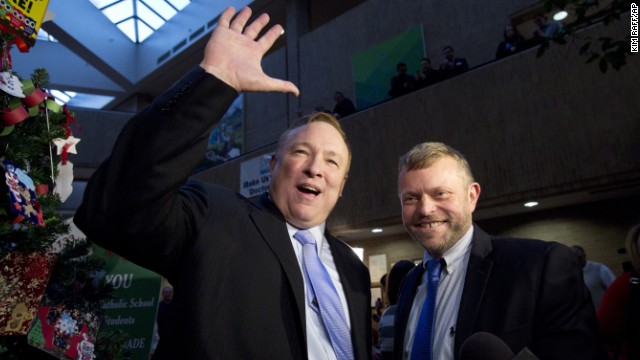 Utah state Sen. Jim Dabakis, left, and Stephen Justesen acknowledge the crowd after being married in Salt Lake City on Friday, December 20. A federal judge struck down Utah's ban on same-sex marriage, saying it conflicted with the constitutional guarantees of equal protection and due process. Many Utah counties began issuing marriage licenses before the state appealed to the U.S. Supreme Court. The high court temporarily blocked enforcement of the lower court ruling until the constitutional questions are fully resolved.
Utah state Sen. Jim Dabakis, left, and Stephen Justesen acknowledge the crowd after being married in Salt Lake City on Friday, December 20. A federal judge struck down Utah's ban on same-sex marriage, saying it conflicted with the constitutional guarantees of equal protection and due process. Many Utah counties began issuing marriage licenses before the state appealed to the U.S. Supreme Court. The high court temporarily blocked enforcement of the lower court ruling until the constitutional questions are fully resolved. 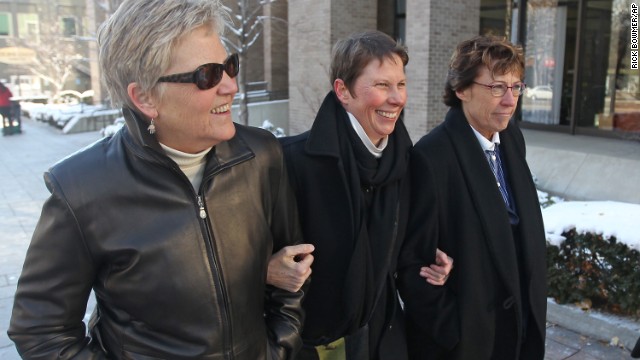 Plaintiffs Laurie Wood, left, and Kody Partridge, center, and attorney Peggy Tomsic leave a federal courthouse in Salt Lake City on Wednesday, December 4, after a judge heard arguments challenging Utah's same-sex marriage ban.
Plaintiffs Laurie Wood, left, and Kody Partridge, center, and attorney Peggy Tomsic leave a federal courthouse in Salt Lake City on Wednesday, December 4, after a judge heard arguments challenging Utah's same-sex marriage ban. 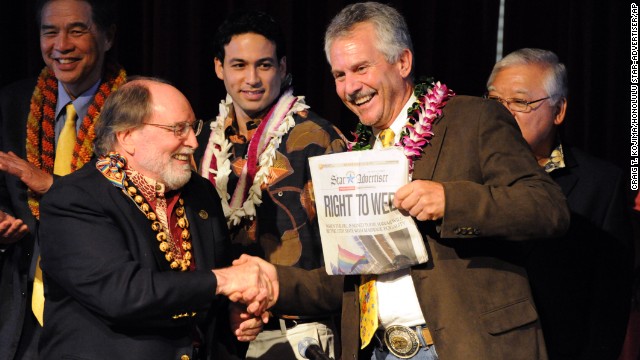 Hawaiian Gov. Neil Abercrombie, left, and former Sen. Avery Chumbley celebrate with a copy of the Star-Advertiser after Abercrombie signed a bill legalizing same-sex marriage in Hawaii on Wednesday, November 13, in Honolulu. Hawaii's same-sex marriage debate began in 1990, when two women applied for a marriage license, leading to a court battle and a 1993 state Supreme Court decision that their rights to equal protection were violated by not letting them marry. Now the state is positioning itself for an increase in tourism as visitors arrive to take advantage of the law, which took effect December 2.
Hawaiian Gov. Neil Abercrombie, left, and former Sen. Avery Chumbley celebrate with a copy of the Star-Advertiser after Abercrombie signed a bill legalizing same-sex marriage in Hawaii on Wednesday, November 13, in Honolulu. Hawaii's same-sex marriage debate began in 1990, when two women applied for a marriage license, leading to a court battle and a 1993 state Supreme Court decision that their rights to equal protection were violated by not letting them marry. Now the state is positioning itself for an increase in tourism as visitors arrive to take advantage of the law, which took effect December 2. 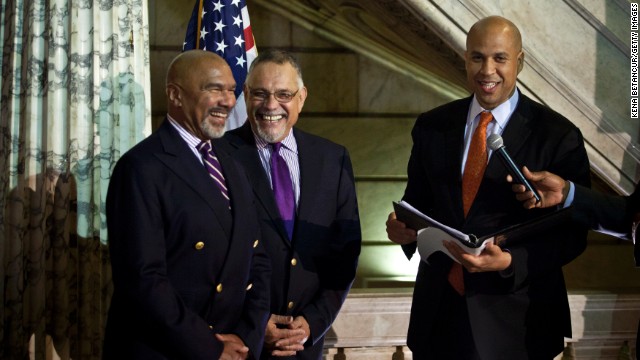 Newark, New Jersey, Mayor Cory Booker officiates a wedding ceremony for Joseph Panessidi and Orville Bell at City Hall on Monday, October 21. The state Supreme Court denied the state's request to prevent same-sex marriages temporarily, clearing the way for same-sex couples to marry.
Newark, New Jersey, Mayor Cory Booker officiates a wedding ceremony for Joseph Panessidi and Orville Bell at City Hall on Monday, October 21. The state Supreme Court denied the state's request to prevent same-sex marriages temporarily, clearing the way for same-sex couples to marry. 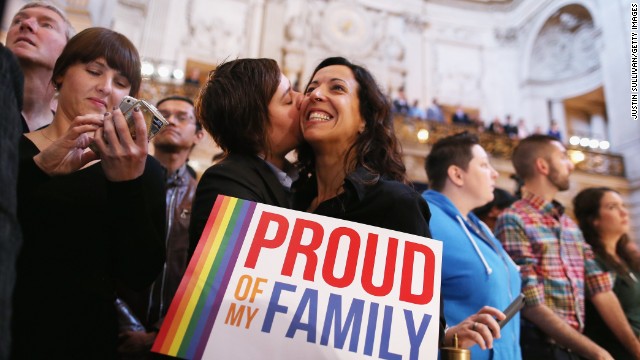 A couple celebrates at San Francisco City Hall upon hearing about the U.S. Supreme Court rulings on same-sex marriage on June 26, 2013. The high court cleared the way for same-sex couples in California to resume marrying after dismissing an appeal on Proposition 8 on jurisdictional grounds.
A couple celebrates at San Francisco City Hall upon hearing about the U.S. Supreme Court rulings on same-sex marriage on June 26, 2013. The high court cleared the way for same-sex couples in California to resume marrying after dismissing an appeal on Proposition 8 on jurisdictional grounds. 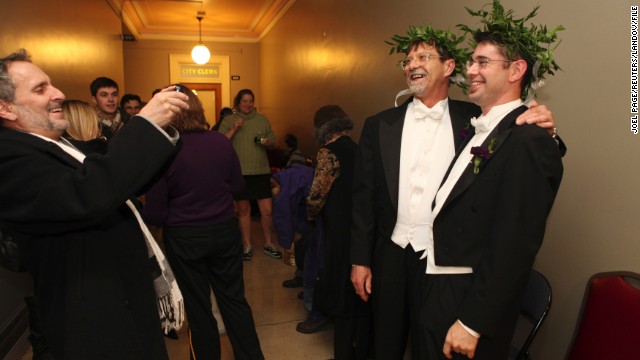 In the other June 26 ruling, the Supreme Court struck down a key part of the Defense of Marriage Act, a 1996 federal law defining marriage as between a man and a woman. Jamous Lizotte, right, and Steven Jones pose for photos while waiting for a marriage license in Portland, Maine, in December 2012.
In the other June 26 ruling, the Supreme Court struck down a key part of the Defense of Marriage Act, a 1996 federal law defining marriage as between a man and a woman. Jamous Lizotte, right, and Steven Jones pose for photos while waiting for a marriage license in Portland, Maine, in December 2012. 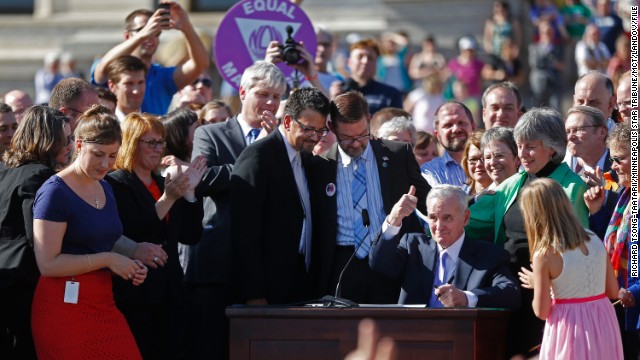 At the state Capitol in St. Paul, Minnesota on May 14, 2013, Gov. Mark Dayton signs a bill legalizing same-sex marriage.
At the state Capitol in St. Paul, Minnesota on May 14, 2013, Gov. Mark Dayton signs a bill legalizing same-sex marriage.  Delaware Gov. Jack Markell holds up legislation on May 7, 2013, allowing same-sex couples to wed in the state.
Delaware Gov. Jack Markell holds up legislation on May 7, 2013, allowing same-sex couples to wed in the state. 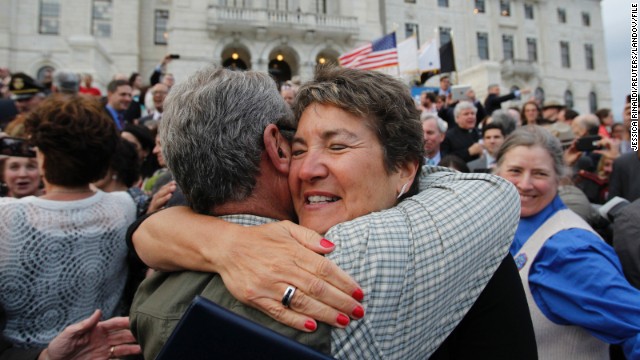 Rhode Island state Sen. Donna Nesselbush, right, embraces a supporter after the Marriage Equality Act was signed into law at the statehouse in Providence on May 2, 2013.
Rhode Island state Sen. Donna Nesselbush, right, embraces a supporter after the Marriage Equality Act was signed into law at the statehouse in Providence on May 2, 2013. 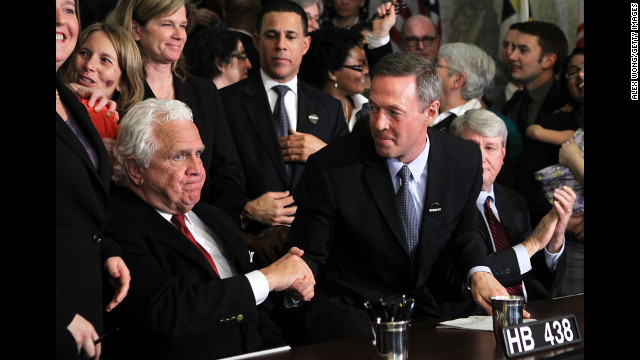 Maryland Gov. Martin O'Malley, center, shakes hands with Senate President Thomas V. "Mike" Miller after signing a same-sex marriage bill on March 1, 2012. The law was challenged, but voters approved marriage equality in a November 2012 referendum.
Maryland Gov. Martin O'Malley, center, shakes hands with Senate President Thomas V. "Mike" Miller after signing a same-sex marriage bill on March 1, 2012. The law was challenged, but voters approved marriage equality in a November 2012 referendum. 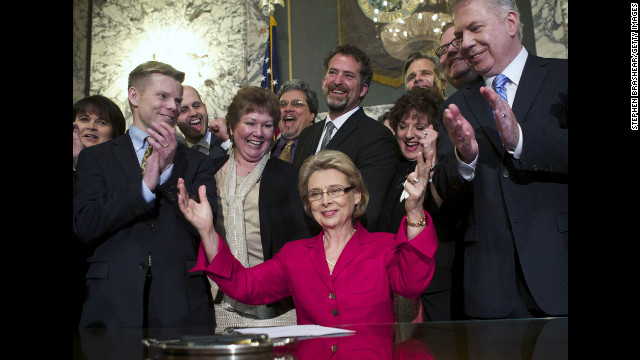 Washington Gov. Chris Gregoire celebrates after signing marriage equality legislation into law on February 13, 2012. Voters there approved same-sex marriage in November 2012.
Washington Gov. Chris Gregoire celebrates after signing marriage equality legislation into law on February 13, 2012. Voters there approved same-sex marriage in November 2012.  Phyllis Siegel, 76, right, kisses her wife, Connie Kopelov, 84, after exchanging vows at the Manhattan City Clerk's office with New York City Council Speaker Christine C. Quinn in attendance on July 24, 2011, the first day New York state's Marriage Equality Act went into effect.
Phyllis Siegel, 76, right, kisses her wife, Connie Kopelov, 84, after exchanging vows at the Manhattan City Clerk's office with New York City Council Speaker Christine C. Quinn in attendance on July 24, 2011, the first day New York state's Marriage Equality Act went into effect. 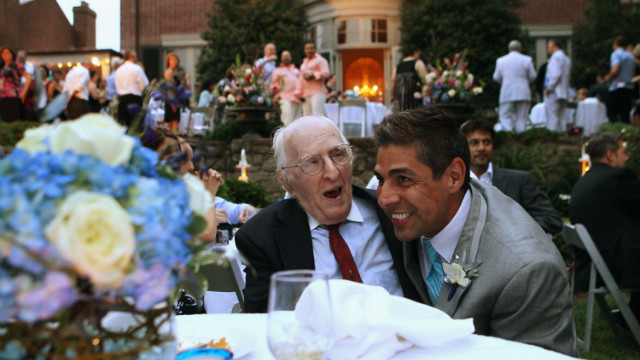 In 2010, television reporter Roby Chavez, right, shares a moment with gay rights activist Frank Kameny during Chavez and Chris Roe's wedding ceremony in the nation's capital. Same-sex marriage became legal in Washington on March 9, 2010.
In 2010, television reporter Roby Chavez, right, shares a moment with gay rights activist Frank Kameny during Chavez and Chris Roe's wedding ceremony in the nation's capital. Same-sex marriage became legal in Washington on March 9, 2010. 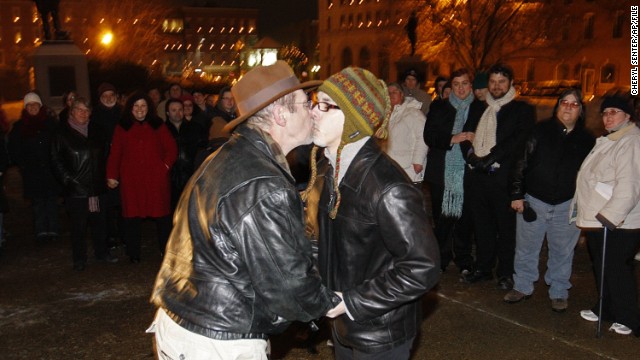 Olin Burkhart, left, and Carl Burkhart kiss on the steps of the New Hampshire Capitol in Concord in January 2010 as the state's law allowing same-sex marriage goes into effect.
Olin Burkhart, left, and Carl Burkhart kiss on the steps of the New Hampshire Capitol in Concord in January 2010 as the state's law allowing same-sex marriage goes into effect. 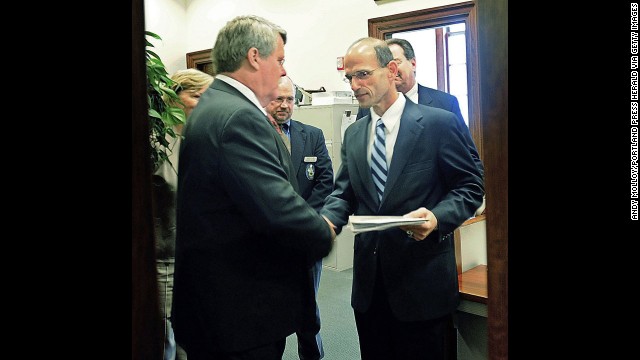 Maine state Sen. Dennis Damon left, hands Gov. John Baldacci the bill that the state Senate passed to affirm the right for same-sex couples to marry on May 6, 2009.
Maine state Sen. Dennis Damon left, hands Gov. John Baldacci the bill that the state Senate passed to affirm the right for same-sex couples to marry on May 6, 2009. 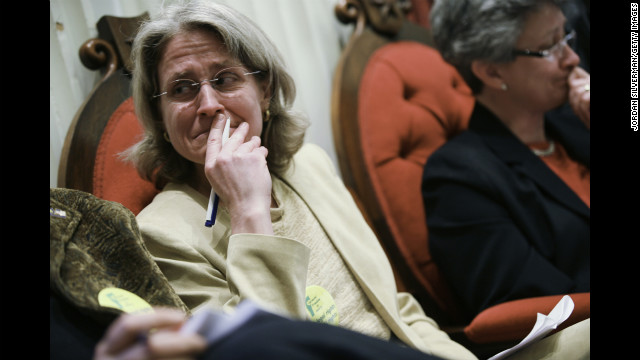 Beth Robinson of the Vermont Freedom to Marry Task Force, who is among those who fought for marriage equality, on April 7, 2009.
Beth Robinson of the Vermont Freedom to Marry Task Force, who is among those who fought for marriage equality, on April 7, 2009. 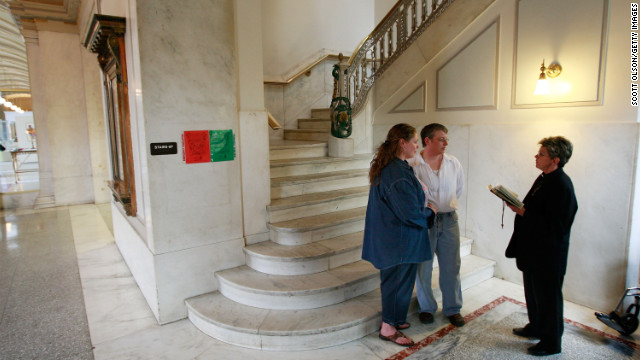 Amy Klein-Matheny, left, and her wife, Jennifer, exchange vows in Iowa after same-sex couples were allowed to marry there with a court ruling on April 3.
Amy Klein-Matheny, left, and her wife, Jennifer, exchange vows in Iowa after same-sex couples were allowed to marry there with a court ruling on April 3. 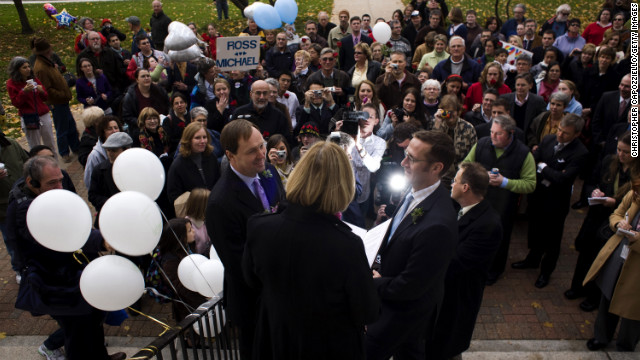 Michael Miller, left, and Ross Zachs marry on the West Hartford Town Hall steps after same-sex marriages became legal in Connecticut on November 12, 2008.
Michael Miller, left, and Ross Zachs marry on the West Hartford Town Hall steps after same-sex marriages became legal in Connecticut on November 12, 2008. 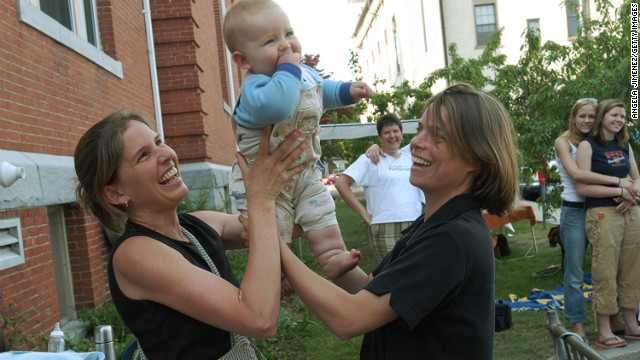 Lara Ramsey, left, and her partner of eight years, Jane Lohmann, play with their 7-month-old son, Wyatt Ramsey-Lohmann. The two wed in 2004 after Massachusetts approved same-sex marriage. Massachusetts was the first state in the U.S. to do so.
Lara Ramsey, left, and her partner of eight years, Jane Lohmann, play with their 7-month-old son, Wyatt Ramsey-Lohmann. The two wed in 2004 after Massachusetts approved same-sex marriage. Massachusetts was the first state in the U.S. to do so.
- John Sutter: The U.S. lacks some very basic protections for LGBT people
- He says good news on same-sex marriage shouldn't distract from that
- Judges in Pennsylvania and Oregon this week overturn marriage bans
- Sutter: It's still legal for employers in 29 states to fire people for being gay
Editor's note: John D. Sutter is a columnist for CNN Opinion and creator of CNN's Change the List project. Follow him on Twitter, Facebook or Google+. E-mail him at ctl@cnn.com. The opinions expressed in this commentary are solely those of the author.
(CNN) -- There's plenty of gay-rights news to celebrate this week:
-- On Monday, a federal judge threw out Oregon's ban on same-sex marriages, writing that his decision was one in support of "families committed to the common purpose of love, devotion and service to the greater community."
-- On Tuesday, the same thing, more or less, happened in Pennsylvania, with a judge in that case writing that "we are a better people than what these laws represent, and it is time to discard them into the ash heap of history." (I mean, wow, right?)
-- And, for those would might say "activist judges" are behind all of this progress, please note that Gallup on Wednesday released data showing 55% of Americans -- a greater percentage than ever shown in that group's polling -- support same-sex marriage rights.
So, in summary: The era of same-sex marriage is upon us; even those who grimaced at NFL player Michael Sam's boyfriend kiss probably can see that; and, therefore, all's well that ends well.
Well, not so much.
In the march toward marriage equality, the United States skipped over other rights that are more fundamental and perhaps more essential for LGBT people.
Consider three facts:
1. It's legal for employers to fire gay and lesbian people because of their sexual orientation in not one or two fringe states but in 29 of them, according to the Human Rights Campaign, a gay rights advocacy group that tracks these things. That's a majority of states where it's legal to fire someone simply for being gay. "It's important to note that, while same-sex couples can legally marry today in Pennsylvania, they can actually be fired from their jobs for talking about their new spouses at work," Charlie Joughin, spokesman for HRC, wrote in an e-mail to me.
Related: No one should be fired for being gay
2. Related to that, there also are 29 states where it's legal for landlords to evict gay and lesbian residents simply because of their sexual orientation. That's true not just of places such as Mississippi but also states with more progressive reputations, such as Pennsylvania and Michigan.
3. Some states make it onerously difficult, if not impossible, for transgender people to legally change their names and update the gender that's listed on their state ID or driver's license. Maybe that sounds inconsequential, but consider going to the airport with an ID that doesn't match who you are and having to explain your gender identity to a TSA agent. "There are 15 (states) that we would give an F" on these issues, said Harper Jean Tobin, director of policy at the National Center for Transgender Equality.
Progress is coming but much too slowly in some cases.
The first employment nondiscrimination laws were passed in East Lansing and Ann Arbor, Michigan, according to Michael Bronski's "A Queer History of the United States." The year was 1972. A range of cities and corporations have come up with their own nondiscrimination policies and rules in the decades since, but state and federal movement has been sluggish. The Employment Nondiscrimination Act passed the U.S. Senate last year but has been a nonstarter in House, thanks to Speaker John Boehner.
To be fair, there are campaigns from LGBT rights groups to put in place these basic protections. The Human Rights Campaign, for instance, started Project One America to "dramatically expand LGBT equality in the South," including freedom from discrimination, which is rampant in that region. But it's clear marriage equality has been the primary focus, for the public, activists and for the news media.
There are some reasonable explanations for that. Some would argue, for instance, that campaigns for marriage equality have helped people realize gay and lesbian people are loving and family-oriented -- and that greater protections will follow that awakening.
I hope that's right, but it's no sure thing.
We're starting to see ourselves in America as a beacon of progressiveness and opportunity for LGBT people. But we also need to acknowledge the reality -- which is that this also is a country where basic protections remain worryingly absent.
No comments:
Post a Comment